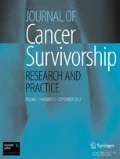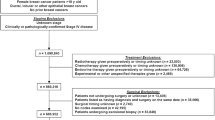Abstract
Introduction
Increasing numbers of cancer survivors and the recognition of their needs beyond recurrence surveillance are stretching resources at many cancer centers. Sometimes, patients solely follow up with providers other than the oncologist without coordinated care transfer plans. This study examines factors associated with transfer of breast cancer survivorship care outside one large cancer center.
Methods
Records on women with breast cancer diagnosed between July 1, 1997 and March 31, 2010 were linked to billing data through March 31, 2012 to identify the details of last oncology follow-up. A patient was classified as having transferred care outside the center if there was no oncology visit for more than 2 years. Clinical and pathologic characteristics were examined in a multivariate proportional hazards model to identify factors associated with transfer of care.
Results
Of 3,924 women with breast cancer, 858 (21.9 %) transferred care outside of our institution, 18 and 36 % at 5 and 10 years, respectively. Factors independently associated with transfer of care were age at diagnosis (unit increase 1.01/year age), stage IIA (HR 1.30, p = 0.02), longer driving distance to the cancer center (HR 1.65, p < 0.01), having had a cancer recurrence (HR 0.15 p < 0.01), and last visit in a medical oncology versus surgical oncology clinic (HR 0.32 p < 0.01).
Conclusions
Many patients with breast cancer do not continue oncology follow-up after treatment. Cancer programs should develop mechanisms to assist patients with care transfer and assure coordinated transfer to other providers to improve continuity of care.
Implications for Cancer Survivors
The results of this study will help the cancer centers identify the population of patients that are most likely to transfer care or become lost to follow up. Prospectively, identifying patients who may be more likely to transfer care will offer opportunities to effectively coordinate posttreatment surveillance with primary care.


Similar content being viewed by others
References
Siegel R, Desantis C, Virgo K, Stein K, Mariotto A, Smith T, et al. Cancer treatment and survivorship statistics, 2012. CA Cancer J Clin. 2012;62:220–41.
Gage EA, Pailler M, Zevon MA, Ch'ng J, Groman A, Kelly M, et al. Structuring survivorship care: discipline-specific clinician perspectives. J Cancer Surviv. 2011;5:217–25.
Gilbert SM, Miller DC, Hollenbeck BK, Montie JE, Wei JT. Cancer survivorship: challenges and changing paradigms. J Urol. 2008;179:431–8.
Rowland JH, Hewitt M, Ganz PA. Cancer survivorship: a new challenge in delivering quality cancer care. J Clin Oncol. 2006;24:5101–4.
Rowland JH, Mariotto A, Alfano CM, Pollack LA, Weir HK, White A. Cancer survivors—United States, 2007. Morb Mortal Wkly Rep. 2011;60:269–72.
Hahn EE, Ganz PA, Melisko ME, Pierce JP, von Friederichs-Fitzwater M, Lane KT, et al. Provider perceptions and expectations of breast cancer posttreatment care: a University of California Athena Breast Health Network project. J Cancer Surviv 2013
Ganz PA. Survivorship: adult cancer survivors. Prim Care Clin Off Pract. 2009;36:721–41.
Hewitt ME, Ganz P, Institute of Medicine (US), American Society of Clinical Oncology. From cancer patient to cancer survivor lost in transition. Washington, D.C., National Academies Press.
Grunfeld E, Levine MN, Julian JA, Coyle D, Szechtman B, Mirsky D, et al. Randomized trial of long-term follow-up for early-stage breast cancer: a comparison of family physician versus specialist care. J Clin Oncol. 2006;24:848–55.
Khan NF, Ward A, Watson E, Austoker J, Rose PW. Long-term survivors of adult cancers and uptake of primary health services: a systematic review. Eur J Cancer. 2008;44:195–204.
Oeffinger KC, McCabe MS. Models for delivering survivorship care. J Clin Oncol. 2006;24:5117–24.
Vanhuyse M, Bedard PL, Sheiner J, Fitzgerald B, Clemons M. Transfer of follow-up care to family physicians for early-stage breast cancer. Clin Oncol. 2007;19:172–6.
Kirsch B. Many US cancer survivors still lost in transition. Lancet. 2012;379:1865–6.
Vaz-Luis I, Ottesen RA, Hughes ME, Marcom PK, Moy B, Rugo HS, et al. Impact of hormone receptor status on patterns of recurrence and clinical outcomes among patients with human epidermal growth factor-2-positive breast cancer in the National Comprehensive Cancer Network: a prospective cohort study. Breast Cancer Res. 2012;14:R129.
de Moor JS, Mariotto AB, Parry C, Alfano CM, Padgett L, Kent EE, et al. Cancer survivors in the US: prevalence across the survivorship trajectory and implications for care. Cancer Epidemiol Biomarkers Prev. 2013;22:561–70.
Cheung WY, Aziz N, Noone AM, Rowland JH, Potosky AL, Ayanian JZ, et al. Physician preferences and attitudes regarding different models of cancer survivorship care: a comparison of primary care providers and oncologists. J Cancer Surviv 2013.
Roorda C, Berendsen AJ, Haverkamp M, van der Meer K, de Bock GH Discharge of breast cancer patients to primary care at the end of hospital follow-up: A cross-sectional survey. Eur J Cancer 2013.
Cowens-Alvarado R, Sharpe K, Pratt-Chapman M, Willis A, Gansler T, Ganz PA, et al. Advancing survivorship care through the National Cancer Survivorship Resource Center: Developing American Cancer Society Guidelines for Primary Care Providers. CA Cancer J Clin 2013.
Acknowledgment
The authors have no relevant financial disclosures, conflict of interest or acknowledgements. The authors did not receive any funding for this project.
Author information
Authors and Affiliations
Corresponding author
Additional information
Presented in part at the Society of Surgical Oncology, Washington D.C. March, 2013.
Rights and permissions
About this article
Cite this article
Kukar, M., Watroba, N., Miller, A. et al. Fostering coordinated survivorship care in breast cancer: who is lost to follow-up?. J Cancer Surviv 8, 199–204 (2014). https://doi.org/10.1007/s11764-013-0323-5
Received:
Accepted:
Published:
Issue Date:
DOI: https://doi.org/10.1007/s11764-013-0323-5




